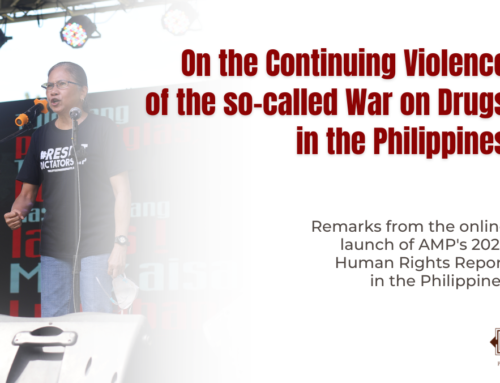By PhilRights Staff
Welcome to HR Insights, a weekly roundup of human rights news in the Philippines. This week…
International Criminal Court to conduct preliminary examination on PH drug war killings
Following 16 months of reported killings and other human rights violations, the Office of the Prosecutor of the International Criminal Court (ICC) has notified the Philippine government that it will start a preliminary examination into the deaths occurring under the so-called war on drugs of the Duterte government.
The Inquirer cites Presidential Spokesperson Harry Roque explaining that the “preliminary examination was meant only to determine if there is reasonable basis to proceed to a preliminary investigation” and is intended to be a “collection and verification of information.”
United Nations special rapporteur for extrajudicial killings Agnes Callamard has welcomed the ICC’s move, reports the Washington Post. The paper quotes Callamard as saying “As I have warned repeatedly, a major human rights crisis has been unfolding in the Philippines, characterized, amongst other things, by a vast number of allegations of extrajudicial executions and a failure on the part of the state to undertake prompt, independent, impartial investigations.”
Albay Representative Edcel Lagman, meanwhile, says that Duterte’s own statements will prove valuable in proving the president’s liability. In a statement reported by InterAksyon, Lagman says that “no less than the President himself on numerous instances has admitted the commissions and/or prodded and condoned the extrajudicial killings.”
InterAksyon then cites Lagman’s list of “incriminating admissions and utterances,” some of which are below:
- “I will not stop until the last pusher on the streets is fully exterminated.”
- “I will kill all the drug lords. Make no bones about it.”
- “We say it’s not the work of police to be wrapping people with plastic and [putting] them in the bag. That is not a job of the police. I just told [them] that one bullet will do.”
- “In Davao I used to do it personally. Just to show to the guys (police officers) that if I can do it, why can’t you?”
- “And I’d go around in Davao with a motorcycle, with a big bike around, and I would just patrol the streets, looking for trouble also … I was really looking for a confrontation so I could kill.”
“Bloodless” week 1 for Tokhang relaunch, but 46 killed since December
In its continued bid to reclaim public trust in Tokhang operations, the Philippine National Police (PNP), through its new spokesman Chief Superintendent John Bulalacao, announced zero deaths recorded in its first week of Tokhang relaunch.
The Philippine Star report quotes Bulalacao: “No casualties were recorded as of the fourth day of Tokhang activities in 17 regions around the country.”
The report adds that “a total of 2,127 operations were conducted while 821 suspected drug personalities surrendered from January 29 to February 1.”
Meanwhile, a PNP statement, cited by the Star, announced that “46 drug suspects were killed during alleged gunfights with policemen in 3,253 anti-drug operations from Dec. 5, 2017 to Feb. 1, 2018.”
While increasing public scrutiny seems to have forced the police to adapt more transparent measures, the police’s insistence on nanlaban narratives to explain so many deaths does not help their cause.
161 Lumad families flee military presence in Surigao del Sur
Davao Today reports that residents from at least 12 indigenous peoples’ communities have sought refuge in order to steer clear of “heavy military presence” in their area.
The report includes an interview with Sarry Campos, spokesperson of a local IP group, who gave initial numbers: “at least 161 families composed of 758 individuals are currently seeking refuge in Km. 9 Barangay Diatagon, Lianga town, while unaccounted number of individuals are currently staying with their relatives.”
Campos explains that military forces have asked “Lumad farmers to provide IDs” and when they fail to do so, “soldiers will take photos and threaten them that if something will happen to military troops, the state forces will go after the civilians.”
As for why there has been an increase in military presence in the area, Davao Today quotes a statement from IP group KASALO-Caraga, saying “All these are being implemented to eliminate opposition against the continuing operation of 23 large scale nickel, chromite and gold mines and the entry of 15 coal mining operations, expansion of banana and oil plantations and other destructive projects within our ancestral lands.”
Must Read: UN High Commissioner for Human Rights Zeid Ra’ad Al Hussein on nationalist strongmen being a clear threat to human rights
In remarks delivered at the Jakarta Conversation on the 70th Year of the Universal Declaration on Human Rights and 25th Year of the Vienna Declaration and Programme of Action, UN High Commissioner for Human Rights Zeid Ra’ad Al Hussein bemoans the rise of nationalist strongmen “who benefit from scapegoating or stigmatising vulnerable people – on the basis of ethnicity and religion, or any other characteristic such as or even drug use,” and calls them “a clear threat to rights.”
Without the need to name names, it is clear Al Hussein had President Duterte in mind. He goes further by urging “government authorities to have confidence in the intelligence and energy of their people, and to employ the Universal Declaration of Human Rights – in its totality – as a guide to law and policy.”





